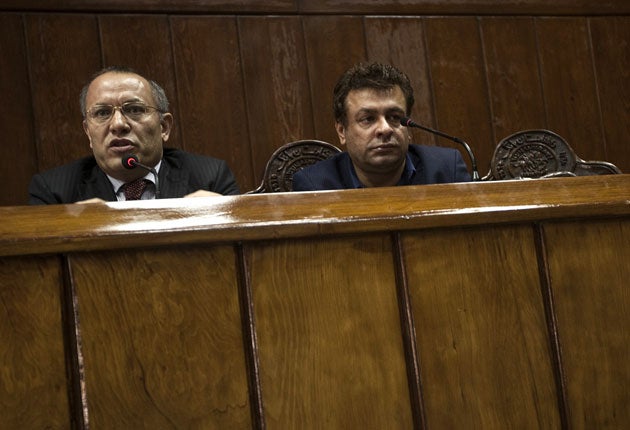$1bn fraud at Kabul Bank puts UK's Afghan pull-out in peril
IMF and Britain's foreign aid department both withhold money for reconstruction

Your support helps us to tell the story
From reproductive rights to climate change to Big Tech, The Independent is on the ground when the story is developing. Whether it's investigating the financials of Elon Musk's pro-Trump PAC or producing our latest documentary, 'The A Word', which shines a light on the American women fighting for reproductive rights, we know how important it is to parse out the facts from the messaging.
At such a critical moment in US history, we need reporters on the ground. Your donation allows us to keep sending journalists to speak to both sides of the story.
The Independent is trusted by Americans across the entire political spectrum. And unlike many other quality news outlets, we choose not to lock Americans out of our reporting and analysis with paywalls. We believe quality journalism should be available to everyone, paid for by those who can afford it.
Your support makes all the difference.Coalition plans to pull out of Afghanistan are being hampered by theft and fraud totalling nearly $1bn, The Independent on Sunday can reveal. Hopes of a timely withdrawal of British troops from the region have been dealt a critical blow by revelations about massive bank frauds which have forced donors to suspend vital international aid.
The Department for International Development (DfID) confirmed last night that it had followed the lead of the International Monetary Fund (IMF) in withholding contributions to bankroll hundreds of "nation-building" projects in Afghanistan.
The move, to "protect taxpayers' money", came as the full extent of the scandal at Kabul Bank – described as the biggest fraud in modern times – became clear. A secret US government report into the debacle "indicates that insiders at Kabul Bank used fraudulent loans to misappropriate $850m (£525m), representing 94 per cent of outstanding loans".
The document points the finger at the former chairman and the former chief executive of Kabul Bank, and criticises the top accountancy firm Deloitte for not doing enough in response to allegations of corruption at the bank. It also highlights how auditors from PricewaterhouseCoopers (PwC) failed to spot any signs of fraud.
The IMF is now refusing to extend any more credit to the war-torn country unless an agreement can be reached on preventing future loans from being stolen.
General Sir Richard Dannatt, former head of the British Army, warned yesterday that the scandal has damaged the chances of an early exit from Afghanistan. He said: "Unless better governance and the rule of law can be firmly established from Kabul downwards, then the whole effort to persuade the Afghan people to back their own government, and not support the Taliban, will continue to be undermined, and any hopes of an early exit by us from Afghanistan will be dashed."
The impact of the corruption at the bank was revealed last night ahead of President Barack Obama's state visit to the UK, during which he is expected to underline the coalition strategy to pacify Afghanistan and withdraw forces by 2014.
The DfID confirmed it had withheld a payment of more than £80m to the Afghanistan Reconstruction Trust Fund. The fund pays for fundamental work and projects, including reform of the justice system, strengthening higher education and stimulating agriculture – all seen as vital to the country's chances of functioning as a stable democracy.
A DfID spokesman said yesterday that the International Development Secretary, Andrew Mitchell, had blocked the contribution in the wake of the corruption scandal "until he is satisfied British taxpayers' money can be properly protected".
Sherkhan Farnood, the bank's former chairman, took more than half a billion dollars in loans. Mahmud Karzai, brother of the Afghan President, received $22m. They are among 10 prominent officials to have taken huge loans who were named last month by Afghanistan's central bank president, Abdol Qadir Fetrat, in the Afghan parliament.
US government documents, part of a recently released report that has now been classified, reveals how US officials are in no doubt as to the extent of the losses, and who is to blame.
The memorandum from USAid, part of a report into the Kabul Bank by the government watchdog the Office of Inspector General, says: "The massive fraud was a criminal act by the chairman of the board and the CEO, aided and abetted by other senior managers and board members."
Faked loan documents were created for fictitious companies registered at the Afghan Investment Support Agency, with funds "diverted to these individuals for their personal use", it alleges.
And it notes that, in addition to oversights by Deloitte, which failed to spot and report warning signs of fraud, a team from PwC didn't identify any fraud at Kabul Bank and gave it "a clean bill of health" – something that "may have acted to delay understanding of the gravity of Kabul Bank's true financial condition both among the examination staff and the international community", according to the document.
President Obama has told President Karzai that US funds will not be used to bail out the bank, according to a US State Department official. Neither the Afghan government nor Kabul Bank responded to requests for comment. PwC did not comment on the audit. And in a statement, Deloitte insisted it has "acted appropriately and performed consistent with its contractual obligations".
Join our commenting forum
Join thought-provoking conversations, follow other Independent readers and see their replies
Comments